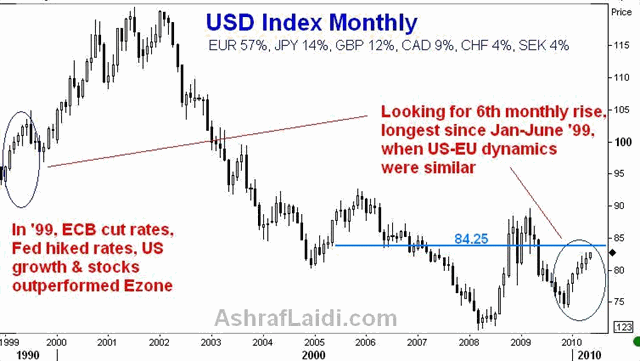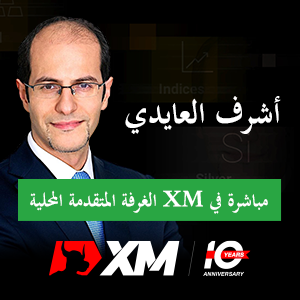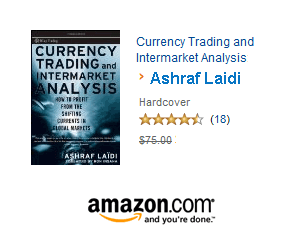1999 & 2010 Similarities in USD, Euro
Starting the month on a high note, the US dollar index could be in for the 6th consecutive monthly gain, which was last seen in Jan-June 1999. Similar to today, 1999 was characterized by contrasting growth prospects between the US and Eurozone as well as escalating doubts with an overvalued euro, high ECB interest rates, and a Germany still reeling from the Asian crisis. (see chart below).
The other 2 striking similarities are the outperformance of US equities relative to their European counterparts as well as the anticipated Fed tightening to occur before that of the ECB. In 1999, the ECB was forced to cut rates in April, followed by a Fed rate hike 2 months later. Today, the Fed is signalling policy normalization (looking to sell assets, raise discount rate, concluded asset purchases), in contrast to the ECB, whose decision to suspend minimum credit rating requirements for Greek govt debt used in ECB liquidity operations comprises a de facto easing.

On the equity side, S&P500 and Dow-30 are +7.8% and +6.9% respectively, while the Dax-30, CAC-40, FTSE-100 and MSCI-Euro are all in the red at -5.2%, -1.11% and -4.8% respectively. These losses would be exacerbated by at least 4 percentage points if the USD returns were used instead of local currency returns.
USDX Focus Considering our expectations for $1.30 EURUSD before quarter-end (this has been our position since February and $1.27 ) before end of Q3, USDX carries momentum to make it past the 84 figue. That is especially given robust momentum in USDJPY, which is seen testing 97 along the same period. If the USD index sticks to its historical inability to rise for 7 straight months, it would mean that June could be a down month.
Super Thursday: ECB Decision/Press Conference & UK Elections
Neither the highest manufacturing UK PMI in 14 years, nor diminishing chances of a hung parliament to the favour of a Tory majority are sufficient to boost the pound against USD. Those planning to trade GBP around Thursdays elections are cautioned that Thursday will be driven by the much anticipated ECB press conference, where JC Trichet will have to explain the controversial decision to abolish minimum credit rating requirements for Greek govt. debt used in ECB operations. There is even talk of a surprise decision by the ECB to purchase bonds, in which case will magnify the contrasting policy directive between the US and ECB.
As the early exit polls will be released after 21:00 GMT Thursday, this means FX activity in GBP will escalate after NY Thursday close and into Friday Asian trade. The usual calm before the Friday Non-Farm Payrolls storm may not take place partly due to the volatility and recurring rumours on the election outcome. As it stands, chances of a hung parliament have fallen to 52% from the 62% reported 2 weeks ago by Betfair.com. Such an outcome is suggested by a Tory majority, which should be a definite positive for GBP. But the question remains: How early in the day will such an outcome be revealed? Thats what readers of this website and my followers on twitter will be getting on an continuous intra-day basis. http://twitter.com/alaidiGBPUSD bearishness must close below the $1.5120 support in order for any realistic chances to break into the $1.50 figure. Any election-driven upside surprise could see gains limited at $1.5380, but $1.55 remains a stubborn obstacle, drawing fresh offers back into $1.5070. In the event that neither major party succeeds in winning majority (hung parliament), fresh losses could drag GBPUSD towards $1.47 into the following week, especially if such an outcome proves to be a close call.
Click here for reminder of our warning on S&P500, Dow-30 and the signal from the Baltic Dry Index.









ANOTHER major similarity with 1999 is the spectacular about face from the ECB, turning to a rate cut in from being so stubbornly hawkish.
The ECB's hane was forced by the economy in 1999 and today its forced by the sovereign debt crisis. And when centbanks make such a 180 turn, currencies do collapse.
Ashraf
Very interesting to read your article on 1999 & 2010 similarities in USD Index. One query on it - 1999, we saw a huge rise in NASDAQ (tech stocks), and tech sector is performing quite well now. There is so much hype being built around social medis networking (likes of twitter etc). Do you think we might see a similar bubble build in tech stocks this time around too?
Cheers,
Abdulrss
From learning history, I know at different period, market has different foucs. This is really a work which needs more experience to know which fact leads the whole market. I will keep on learning your book.
Ashraf
Ashraf
I'm long USD/JPY and wondering if you could give a solid support level for the pair. Not sure if I should add to my position at this point. Seems a winner in the long-run, but for now, risk-aversion seems to be crushing it. Any thoughts would be appreciated. Thanks.
Ashraf
Sounds familiar ... if China goes bust UST goes bust, too ..and that is deflation not inflation.